THE FBA SDNY UNITED NATIONS REPORTER SERIES
By Julianne Romy[1]
FBA UN Reporter
November 25, 2019
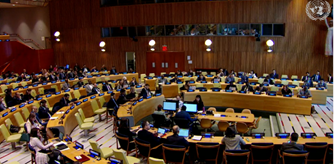
On October 23rd, 2019, the United Nations General Assembly considered the seventh annual report of the International Residual Mechanism for Criminal Tribunals[2] (“Mechanism”) presented by Judge Carmel Agius, President of the Mechanism.[3]
The Mechanism was established by a United Nations Security Council resolution in 2010 to succeed the International Criminal Tribunal for Rwanda (“ICTR”) and the International Criminal Tribunal for the former Yugoslavia (“ICTY”) following the completion of their respective mandates. The Mechanism, like its predecessors, was born of the shared commitment to peace, justice, and the rule of law. President Agius noted that the Mechanism recognizes the “fundamental need to close the impunity gap by concluding the work” of the ICTR and ICTY, including by “ensuring that the remaining fugitives who were indicted by the [ICTR] can, and will still be tried.”
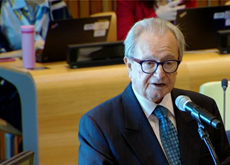
President Agius noted the “solid progress” in the Mechanism’s caseload during the reporting period covering the period from 1 July 2018 to 30 June 2019:
Prosecutor v. Karadžić – On March 28th, 2019, the Appeals Chamber rendered its Appeals Judgement reversing some of Karadžić’s convictions while affirming his remaining convictions for genocide, crimes against humanity, and war crimes. The Appeals Chamber set aside Karadžić’s sentence to 40 years of imprisonment, instead sentencing him to life imprisonment.
Prosecutor v. Stanišić and Simatović – In February 2019, the Prosecution concluded the presentation of its case in the retrial of Stanišić and Simatović, who had been acquitted of crimes against humanity and war crimes by the ICTY Trial Chamber in 2013. Stanišić commenced the presentation of his case in June 2019 and Simatović commenced his in November 2019. The judgement is expected to be delivered by the end of 2020.
Prosecutor v. Mladić – The briefing of the appeals brought by both the Prosecution and Mladić was concluded in November 2018. While three of the five judges were replaced, the Appeals Chamber expects to deliver its Appeals Judgement by the end of 2020 as scheduled.
Prosecutor v. Jojić and Radeta – The Appeals Chamber is currently in receipt of an appeal filed by Serbia against the Mechanism’s decision to revoke the referral of a contempt case against Jojić and Radeta to Serbia.
Prosecutor v. Ngirabatware – On September 27th, 2019, the Mechanism Appeals Chamber issued its Review Judgement, holding that Ngirabatware’s convictions for direct and public incitement to commit genocide remain in force because he failed to prove that the witnesses underpinning his convictions had truthfully recanted their trial testimonies. On October 10th, 2019, the Mechanism confirmed Ngirabatware’s Indictment for contempt of court and incitement to commit contempt of court. The Prosecutor requested the joinder of Ngirabatware’s case with Prosecutor v. Turinabo and al., in which the accused are alleged to have interfered with witnesses in an effort to secure the overturning of Ngirabatware’s convictions for direct and public incitement to commit genocide.
President Agius noted that the Mechanism is not only tasked with completing its current judicial caseload, but that it also plays a role in protecting victims and witnesses, supervising the enforcement of sentences of those convicted by the ICTR, ICTY, and Mechanism, providing assistance to national jurisdictions, monitoring the cases referred to national jurisdiction, and preserving and managing the archives of the ICTR, ICTY, and the Mechanism.
In this regard, President Agius emphasized the need for cooperation between the Mechanism and member states on several issues, including the enforcement of sentences and the tracking and arrest of fugitives indicted by the ICTR. He noted that fifty convicted individuals are currently serving sentences in cooperating states, two are awaiting their transfer to serve their respective sentences in cooperating states, and one individual remains in the United Nations Detention Facility in Arusha, Tanzania, awaiting his trial. As to the eight fugitives indicted by the ICTR, President Agius urged member states to take measures to secure their arrest and transfer to the Mechanism. For instance, while one fugitive was located in South Africa, South African authorities have not yet executed the order for his arrest.
Concluding his report, President Agius noted that “to interrupt the journey of international justice at this stage would be a betrayal to the victims, an encouragement to the perpetrators, and a turning back from the international community’s stated commitment to the rule of law and accountability” and urged the international community to continue supporting the work of international criminal tribunals.
Several member states’ delegations made remarks following President Agius’s report.
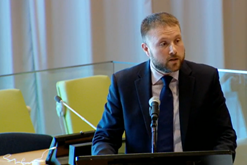
The Distinguished Representative of Australia, speaking on behalf of Australia, Canada, and New Zealand (“CANZ”), noted CANZ’s support for the work of the Mechanism. CANZ also welcomed the Mechanism’s steps taken to combat sexual harassment and discrimination, as well as to address its significant gender imbalance. Lastly, CANZ urged member states to strengthen their cooperation in an effort to secure the arrest of the eight remaining fugitives indicted by the ICTR.
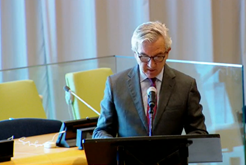
The Distinguished Representative of the European Union (“EU”), speaking on behalf of the EU and its member states, and with whom Turkey, Macedonia, Montenegro, Albania, Liechtenstein, Ukraine, Moldova, and Georgia aligned, recalled all member states’ international legal obligation to provide assistance to the Office of The Prosecutor (“OTP”) in the search and arrest of fugitives. The EU welcomed the establishment of a joint task force between the OTP and Zimbabwean authorities and encouraged a further strengthening of partnerships. The EU noted with concern the impact of budget constraints on the Mechanism. Lastly, the EU noted that it fully subscribed to remarks made in the Mechanism report concerning gender imbalance within the Mechanism.
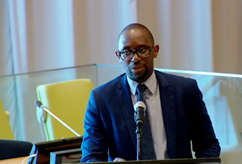
The Distinguished Representative of Rwanda thanked the Mechanism for its continued efforts in the pursuit of justice for the victims of genocide committed in Rwanda in 1994. Rwanda noted that the Mechanism’s legacy will essentially be tested on two fronts: the first concerning the arrest of fugitives indicted by the ICTR; the second concerning the fight against genocidal ideology, including genocide denial. Rwanda further insisted that those individuals who served their sentences should return to Rwanda rather than living abroad at the expense of member states. Rwanda also advocated for a more comprehensive standard on conditional release, based on stringent eligibility requirements. Lastly, Rwanda reiterated its request to host the ICTR’s and Mechanism’s archives, noting that they constitute an integral part of Rwanda’s history.
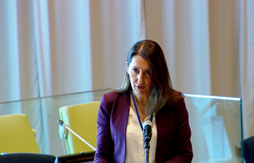
The Distinguished Representative of Serbia recalled the country’s commitment to fulfil its international obligations, including by giving the Mechanism free access to evidence, witnesses, archives, and other documents, as well as responding positively to all requests made by the Mechanism. Serbia noted the drastic improvements to its judicial system and the increased regional cooperation with Bosnia and Herzegovina and Croatia.

The Distinguished Representative of the United States applauded the Mechanism’s commitment to ensure justice for the crimes committed in Rwanda and the former Yugoslavia. The United States recognized the Mechanism’s tireless search for the fugitives indicted by the ICTR, urging South African authorities to take on its responsibility as a leader in the United Nations Security Council and cooperate fully with the Mechanism in securing the arrest of the fugitive located in South Africa. Lastly, the United States commended the Mechanism’s outreach activities, transitional justice initiatives, and capacity building efforts.
[1] Julianne Romy is an LL.M. in U.S. Law candidate at Fordham University School of Law. She is expected to graduate in the Spring 2020.
[2] U.N. Secretary-General, International Residual Mechanism for Criminal Tribunals: note by the Secretary-General, U.N. Doc. A/74/267 (Aug. 1, 2019).
[3] Judge Carmel Agius was appointed as President of the Mechanism by the United Nations Secretary-General, effective January 19th, 2019. He succeeds to Judge Theodor Meron who served as President of the Mechanism between 2012 to 2019.